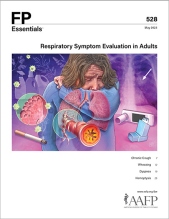
This clinical content conforms to AAFP criteria for CME.
In adults, chronic cough is a nonproductive or productive cough lasting longer than 8 weeks. Coughing is a reflex to clear the lungs and airways, but repetitive, long-term coughing can cause chronic irritation and inflammation. Approximately 90% of chronic cough diagnoses have common nonmalignant etiologies, including upper airway cough syndrome, asthma, gastroesophageal reflux disease, and nonasthmatic eosinophilic bronchitis. In addition to history and physical examination, initial evaluation for chronic cough includes pulmonary function testing and chest x-ray to assess the lungs and heart and for fluid overload, and evaluate for neoplasm or lymph node enlargement. If the patient has red flag symptoms, such as fever, weight loss, hemoptysis, or recurrent pneumonia, or has persistent symptoms despite optimal drug treatment, advanced imaging with chest computed tomography scan is indicated. Management of chronic cough includes identifying and managing the underlying cause as outlined in the American College of Chest Physicians (CHEST) and European Respiratory Society (ERS) guidelines for chronic cough. In diagnoses of refractory chronic cough with uncertain etiology and a negative evaluation for life-threatening causes, cough hypersensitivity syndrome should be considered and managed with gabapentin or pregabalin and a trial of speech therapy.
Case 1. EW is a 48-year-old patient who comes to your office with a dry cough of 3 months’ duration. It began insidiously and now worsens with outdoor activity. The cough has not improved with antitussive drugs. He reports no fever, weight loss, night sweats, or dyspnea. He takes over-the-counter omeprazole as needed for gastroesophageal reflux disease but no other drugs.
Subscribe
From $350- Immediate, unlimited access to FP Essentials content
- 60 CME credits/year
- AAFP app access
- Print delivery available
Edition Access
$44- Immediate, unlimited access to this edition's content
- 5 CME credits
- AAFP app access
- Print delivery available
